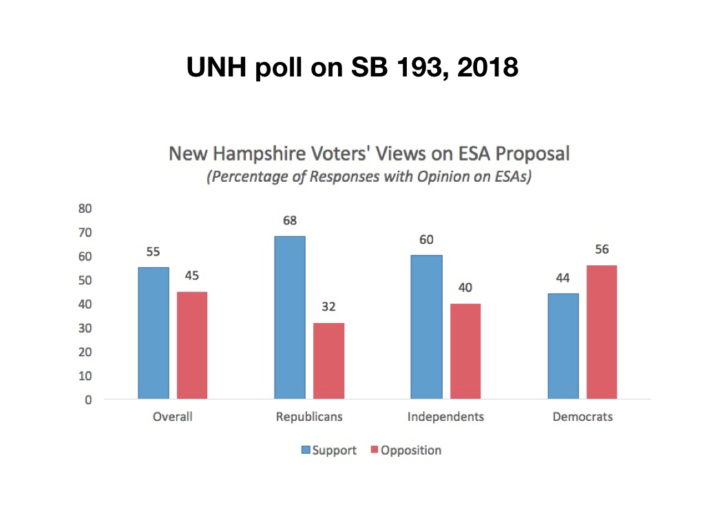“I think that eventually, school choice is going to be part of education.” Those were the words of Democratic state Rep. Barbara Shaw of Manchester, as she voted in the House Education Committee on Thursday to retain House Speaker Sherm Packard’s Education Freedom Accounts bill.
We’d like to thank Drew Cline, President, Josiah Bartlett Center for Public Policy for this Op-Ed. If you have an Op-Ed or LTE
you would like us to consider please submit it to Skip@GraniteGrok or Steve@GraniteGrok.com.
Problems with a redrafted version of the bill caused the chairman to recommend retention rather than trying to move forward with a flawed bill.
Shaw is a bellwether representative on the issue of school choice. A career public school educator with a master’s degree in education administration, Shaw has decades of experience in public schools in New Hampshire. In 2018, she voted on first reading to pass SB 193, the initial Education Freedom Savings Accounts bill.
She supports giving families more educational choices, a change she believes is inevitable. But as she said on Thursday, getting the details right is the key to creating a choice program for New Hampshire. Shaw’s prediction is noteworthy in part because it comes from her, and in part because it reflects a growing recognition that educational choice has reached a saturation point in the broader culture.
In 2018, UNH polled Granite Staters about the Education Freedom Accounts bill. It found that 55% of voters supported Education Freedom Accounts, and 60% of registered independents did. Even 44% of Democrats supported it.
EdChoice polled New Hampshire recently and found that when Granite Staters are told what Education Freedom Accounts are, 70% support them.
Then there is parental experience with schooling during the pandemic. This school year has given middle-and upper-income families whose children generally do well in school a taste of what it’s like for families whose children struggle in a traditional school environment.
Local public schools serve many students very well. But there are always students who don’t fit into the system. Those from higher-income families have always had the option to move to another district or choose another type of school. But for many families, particularly those at the lower ends of the income distribution, options are very limited. Many wind up stuck in a school that doesn’t work well for them.
Average Americans who may never have thought about school choice before now think the system needs to change.
A national poll conducted monthly for the National Parents Union since the start of this school year reflects the change. A majority of parents say schools should not return to normal after the pandemic, but “should be focused on rethinking how we educate students….”
It’s easy to understand why the pandemic pushed this shift in thinking. In addition to the frustrations of dealing with whatever option the local school district has offered, parents are taxpayers too,. They can see that in many cases they’ve paid more every year without getting corresponding increases in services.
Nashua, where parents have initiated a recall of school board members over remote instruction, is a good example.
From 1995-2019 real, inflation-adjusted spending per-pupil in the Nashua School District rose by 24% while student enrollment declined by 10%.
Moreover, Nashua continued to hire more staff while educating fewer students. Total staff increased by 23% while non-teaching staff increased by 30%.
It’s a similar, though less dramatic, story in Manchester, where the superintendent has recommended closing one school and the city might close more because of declining enrollment.
In the Queen City, enrollment declined by 14% from 1995-2019 while real per-pupil spending increased by 11%. Total staff increased by 20% while non-teaching staff increased by 30%.
Parents are at a breaking point. As our culture has shifted to on-demand, a-la-carte service for almost everything, education continues to behave like a regulated monopoly, charging higher prices every year without offering much in the way of additional options tailored to fit individual needs.
Parents have grown increasingly frustrated with a system that has been slow to adapt to changing needs. Now those needs are urgent for a much larger percentage of children than usual.
Parents aren’t willing to wait any longer. And the broader public agrees that children should not have to keep waiting.
School choice programs already operate in 29 states, the District of Columbia, and Puerto Rico. Polls show they have majority support. They are not fringe or extreme. They’re what Americans — and Granite Staters — want.
Rep. Shaw was right. Choice is coming. It’s just a matter of when and how.





